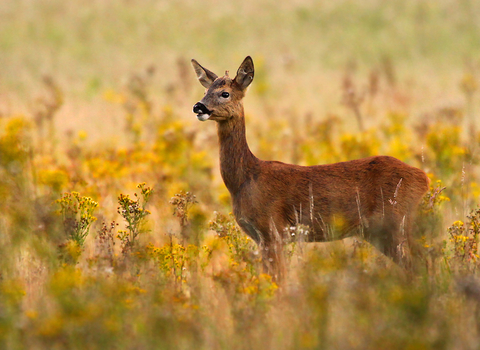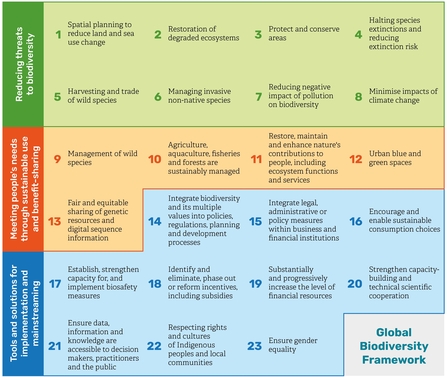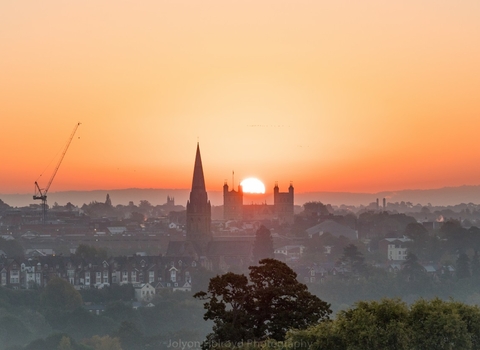What is COP16?
COP stands for 'Conference of the Parties', which are regular United Nations (UN) conferences on its different conventions (written legal agreements between countries and the UN).
This year the 16th nature or 'biodiversity' Conference of the Parties (COP16 for short) took place from 21st October to 1st November 2024, in Cali, Colombia.
COP16 was the first nature COP since the adoption of the Kunming-Montreal Global Biodiversity Framework, which was established at COP15 in December 2022. At COP16, governments reviewed how well the framework is being adopted by member countries and assessed progress against the targets it contains.
The Global Biodiversity Framework
The Global Biodiversity Framework follows years of global negotiations and supports the achievement of the Sustainable Development Goals. It aims to set the world on track to living in harmony with nature by 2050.
Among the Framework’s key elements are four goals for 2050 (seen down the left column of the diagram) and 23 targets for 2030.
What do The Wildlife Trusts want to see from COP16?
Two years ago, nearly 200 countries came together to agree a Global Biodiversity Framework. At the time it was enthusiastically championed by the UK – but we’ve yet to see progress on halting, let alone reversing, nature loss. It is vital that the UK Government puts in place policies and funding to reduce river pollution, protect more land for nature and halve the use of pesticides, otherwise this country will fail its targets and completely undermine the international agreement.
The Wildlife Trusts have published a new report Local to Global: the Global Biodiversity Framework and what the UK needs to do to implement it, which outlines the steps UK Government must take to reverse nature loss and meet global targets.
The new UK Government must announce bold action for nature at home on the international stage. At present, we are only on course to meet four out of our 40 domestic environmental targets. The UK also continues to be one of the most nature-depleted countries in the world.
The Wildlife Trusts are calling on the UK Government to take swift action on the following promises
© Lizzie Wilberforce
Protect 30% of land and sea by 2030
The UK Government played a key role in setting this global goal and has promised to meet it at home. However, the UK is falling behind, with only 2.93% of land in England properly protected for nature and just 9.7% of the sea effectively managed.

Roe deer ©Jon Hawkins - Surrey Hills Photography
Publish a plan to stop nature's decline by 2030
The UK Government has said it will review its Environmental Improvement Plan (EIP) by the end of the year. The new version of this plan must clearly show how the UK will meet its environmental targets and global biodiversity commitments, including the policies and funding required.

A rainbow trout, Alexander Mustard/2020VISION
Halve pesticide harm and clean up rivers by 2030
The Global Biodiversity Framework goals include halving the damage from pesticides and reducing pollution from excess nutrients. To achieve this, the UK needs to release a National Action Plan for Pesticides (which is already six years overdue) and ensure environmental regulators can enforce penalties when water pollution laws are broken.
What The Wildlife Trusts will be doing
Throughout COP16, The Wildlife Trusts will be shining a spotlight on the positive and inspirational actions that can be taken by governments, by businesses and by individuals too, in an inclusive way, to help limit and cope with the impacts of the global crisis and restore nature.
Want to find out more?
During COP16, The Wildlife Trusts will be sharing bitesize video updates live from the action in Columbia - helping to explain these complex discussions in an easily digestible way. We'll also be sharing what these conversations mean for us here in the UK - and the actions we want to see UK Government take as a result.
Sign up below to receive email updates.




